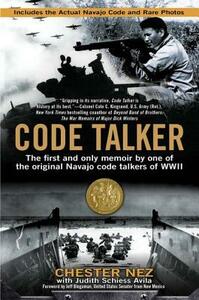Take a photo of a barcode or cover
Interesting read...not super challenging regarding how it's written, but fascinating to read more about the traditional Dine culture and how it so often clashes with the historically "white" world. Also, pretty intense to read about the conditions the Code Talkers faced in the Pacific arena of WWII.
This was interesting: the Navajo's, the code talkers, as well as the history of the war in the Pacific.
informative
inspiring
reflective
medium-paced
challenging
emotional
informative
inspiring
sad
medium-paced
Reading Chester's story of the Code Talkers told me once again of the hardships faced by Native Americans when they attended boarding schools. He and the others were heros in WWll, took too long to be recognized for their service. Great story . . .
adventurous
emotional
funny
hopeful
informative
lighthearted
reflective
sad
tense
medium-paced
I had read earlier versions of this story as it is written by my sister-in-law, and the beginning of the book seemed to have a lot of the flavor of that first version, though that was written as a novel as opposed to a memoir. I think it took me quite a few chapters to start to get the feel of the newer version -- though I don't know why that would make a difference! It is definitely a well-polished book with almost excruciating attention to detail. I say excruciating not to be critical, but I don't particularly like a lot of description, and this book definitely pays a lot of attention to surroundings and sounds, etc. The story itself is very interesting and I became much more engaged after the battles and the back and forth to Chester's childhood. It is, I can be certain, a meticulously documented story, and it was an interesting contrast to another book I recently read about an American soldier who was captured by the Japanese on the Pacific islands. It was very nice to read that Chester believed (from what he witnessed) that the Americans treated the Japanese prisoners very well. (The Japanese did not, or at least from this one particular soldier's experience.)
The use of the Navajo language as a code in war almost seems too easy for the U.S. government to ever employ. I would imagine it was fought over and poo poohed by many high ranking officials and was therefore kept a huge secret much longer than it ever would have been if it was THEIR idea. The fact that the original coding system (shackle) took almost four hours to decode whereas the Navajo code took minutes, would definitely change the outcome of a war. How could it not? I think it is a great tragedy that these Navajo solders were not recognized much, much earlier for their amazing contributions. (I don't believe it was because they wanted to keep it in the vault in case they wanted to use it again. I think it was one of those things that could only be employed once ... because as was implied in the book, there were other Navajos recognizing their language and making innocent comments.)
Anyway, it is an amazing tribute to Chester Nez and his fellow code talkers, and I highly recommend it!
The use of the Navajo language as a code in war almost seems too easy for the U.S. government to ever employ. I would imagine it was fought over and poo poohed by many high ranking officials and was therefore kept a huge secret much longer than it ever would have been if it was THEIR idea. The fact that the original coding system (shackle) took almost four hours to decode whereas the Navajo code took minutes, would definitely change the outcome of a war. How could it not? I think it is a great tragedy that these Navajo solders were not recognized much, much earlier for their amazing contributions. (I don't believe it was because they wanted to keep it in the vault in case they wanted to use it again. I think it was one of those things that could only be employed once ... because as was implied in the book, there were other Navajos recognizing their language and making innocent comments.)
Anyway, it is an amazing tribute to Chester Nez and his fellow code talkers, and I highly recommend it!
An important book of great historical significance. Everyone should read this.
A very interesting first-person account of a little-known group of Navajos who were highly instrumental in the victory over the Japanese in WWII.


